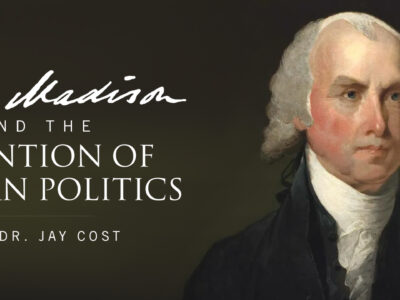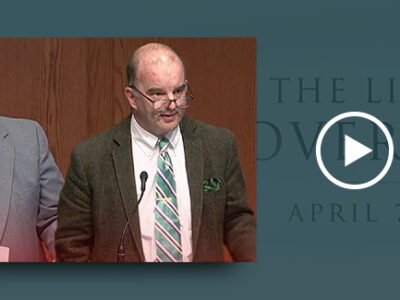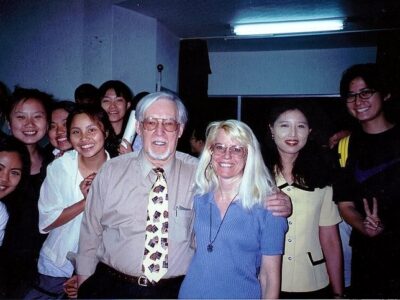With his head under my kitchen sink last week, talking politics and using tools I had never seen, Keith the plumber said, “My daughter stood up in class and told her eighth grade school teacher, ‘I’ll read your assignments on Darwinism, ace your tests, but I won’t believe it!’” It’s interesting that Keith mentioned this exchange because there’s an important link between Charles Darwin and today’s national politics.
In his latest book, Living Constitution, Dying Faith: Progressivism and the New Science of Jurisprudence, Bradley Watson describes how “social Darwinism” birthed modern-day politics, jurisprudence, and the Progressive Movement. Social Darwinism is a belief system that applies Darwinian evolution theory to political theory and action. For social Darwinists, according to Watson, “Darwin comes to be understood less as a biologist and more as a political philosopher or political scientist rejecting old modes and orders.”
For social Darwinists, the state is like an organism that is always evolving. The state must be forever in the process of change to survive and thrive. And moral-political truth is not a permanent thing. It too is always changing and “relative to one’s moment in History,” writes Watson. “Change in itself becomes the end, and it is always preferable to its opposite.”
The progressives would argue that change is life. Governing by founding principles and truths is decay and even a “death wish.” They believe that bailing out Wall Street, Detroit, the welfare programs of the 1930s and ’60s, federal healthcare programs, etc., are stimuli breathing life into the founders’ dead Constitution.
In addition to social Darwinism, the other critical element of the progressive movement is philosophical pragmatism. Combining social Darwinism and pragmatism forms post-1920s progressivism. Watson acknowledges “it is possible to draw a sharp distinction between the two thought systems.” Yet he adds, “In other ways it is easy to see the convergence of the two philosophical systems.”
If social Darwinism is the intellectual engine of modern progressivism, Watson, a critic of progressivism, sees pragmatism as its fuel: “While pragmatism has much in common with earlier empiricism, it is purer in its . . . concentration on action and power . . . and the pragmatist understanding of what works is linked to the inevitability of change and growth.”
In the father of modern public education, John Dewey, we find one of the first modern progressives because his work powerfully blended social Darwinism and pragmatism. “It is in Dewey that social Darwinism and pragmatism become an intellectual political force to be reckoned with,” writes Watson. Grove City College political science professor Michael Coulter said, “Dewey’s desire to use education for social change is part of the reason why Americans are so dissatisfied with public education.” Indeed, thinking the political route of social change was “frustratingly slow,” Dewey, according to Henry Edmondson, thought “using education to change the world is far more efficient.” I think Dewey would be thrilled to see Obama’s breathtaking pace of progressive change in the political realm today.
“The problems of our politics are not merely the result of the last election or the last few elections,” Coulter said. “Intellectual movements like social Darwinism set us adrift from founding principles and lead us to a government taking on new roles every day in order to ’save us.’ Only when we understand the deeper disease will we not see the symptoms as the biggest problem.”
I have a feeling that Keith the plumber’s daughter understands.
“The single best indicator of how a person will vote is how he or she worships God,” says pollster Frank Luntz in What Americans Really Want . . . Really. Does Luntz’s insight apply to the way people view healthcare reform?
He notes that there is indeed “a partisan difference in religion,” whereas 60 percent of Republicans attend church on a weekly basis, only 25 percent of Democrats attend worship. “Evangelicals are heavily Republican,” Luntz says, adding that “atheists and agnostics are almost exclusively Democrats.” For the most part, these numbers square with the Pew Forum’s Religious Landscape Survey.
Last week I spoke as a panelist at a healthcare forum sponsored by a Republican organization in an upscale neighborhood of Pittsburgh. Because the forum was advertised as a community event, I assumed there would be a broad spectrum of political views represented in the audience. In other words, I was prepared to take some flak for my conservative views. When a minister opened the program in prayer and almost every head bowed, I thought I might have been on friendly turf, but I still wasn’t sure. Due to the nature of the questions from the 130-person audience it became clear that most of the crowd was opposed to and fearful of Congress’ plans for healthcare reform. I was on friendly turf. But it wasn’t because most people in the audience prayed. Lots of praying people don’t share this Orthodox Presbyterian’s views on what Congress has been doing lately.
Was the room filled primarily with church-going Republicans’ Most likely. Does that mean that most supporters of healthcare reform are atheist Democrats’ Hardly.
True, most supporters of the current versions of healthcare reform, according to the Pew Forum, are Democrats, while less than one-in-five are conservative, white evangelical Republicans. Yet, as of last March, a large number of Americans supported at least a government guarantee of healthcare insurance. This group included elements of the Christian community, consisting of 48 percent of white evangelicals, 55 percent of Catholics, and 56 percent of mainline Protestants. The Pew Forum also notes that Christian organizations and churches with left-leaning political views are organized and very much in favor of the efforts of Congress. An organization called “Faith for Health,”a coalition of 33 left-leaning Christian organizations and denominations, is running a sophisticated program that includes congregational guides and grassroots informational campaigns for Christians and Jews. Among the coalition are eight large Protestant denominations, including the Episcopal Church, the Evangelical Lutheran Church, and the United Methodist Church. Meanwhile, the “Freedom Federation,” a coalition of mostly politically active Christian groups represents some Christians from the right.
Is one’s faith the single best indicator of the way Americans feel about congressional efforts for healthcare reform? The Pew Forum claims a person’s political affiliation is more reliable. But evidently denominational affiliation can be a good indicator as well. Clearly, there’s a connection between one’s faith and one’s view of healthcare reform.




